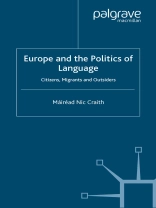Do political boundaries impact on concepts of language? How significant is language for citizenship in contemporary Europe? Can disputed languages acquire full status? Should non-European languages receive recognition from the EU? These are among the many questions explored in this new study of official, regional and disputed languages in an ever-changing European context. Broad policy issues and the performance of the range of instruments of policy at local, national and European levels are illustrated with reference to case studies across Europe.
Inhaltsverzeichnis
Acknowledgements List of Tables List of Maps List of Abbreviations Acknowledgements Series Editor’s Preface PART 1: EUROPE: DISCOURSES OF INCLUSION AND EXCLUSION Conceptions of Europe Divergence and Divisions Inclusion/exclusion and Citizenship Conclusion PART 2: STATEHOOD, CITIZENSHIP AND LANGUAGE Community, Language and Citizenship Language and Statehood: A Case Study from the Balkans Citizenship and Language: The Baltic States Conclusion PART 3: THE EUROPEAN ELITES: OFFICIAL LANGUAGES IN THE EU Official, Working Languages Towards a Lingua Franca Citizens and their Languages Conclusion PART 4: ‚A HIERARCHY OF LEGITIMACIES‘: MINORITY LANGUAGES Minority Languages and National Ideologies A Hierarchy of Minority Languages The Transnational Context Conclusion PART 5: LANGUAGES ACROSS BORDERS Ethnic Conflicts and State Boundaries Impediments to Cross-border Co-operation European Support for Transfrontier Co=operation Conclusion PART 6: THE QUEST FOR RECOGNITION: CONTESTED LANGUAGES Language, Boundary, Identity Language and Legitimacy The European Context Conclusion PART 7: NOMADS, LANGUAGE AND LAND Identities and Lifestyles The Significance of Language Land, Region and Space Conclusion PART 8: THE OUTSIDERS: NON-EUROPEAN LANGUAGES Immigrants in Europe Non-European Languages in Western Europe The Discourse of Autochthony Conclusion PART 9:EUROPE AND THE POLITICS OF BELONGING Europe and its Languages The Implications of Equality Revising Language Policies in Europe Conclusion Select Bibliography Index
Über den Autor
MÁIRÉAD NIC CRAITH is Professor of Irish Culture and Language at the University of Ulster, UK. She has published extensively on languages and cultures in Europe and was joint winner of the 2004 Ruth Jena Michaelis Research Prize for folk life. Máiréad has worked closely with different European organizations including the European Bureau for Lesser-Used Languages.












